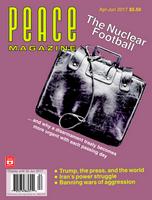
Peace Magazine April-June 2017, page 2. Some rights reserved.
Search for other articles by peacemag here
The US State Department has approved a resumption of weapons sales that is linked to Saudi Arabia’s bombing of civilians in Yemen. The proposal would reverse a decision made late in the Obama administration to suspend the sale of precision-guided munitions to Riyadh, which leads a coalition conducting air strikes against Houthi rebels in Yemen.
The US is not the only country involved in this scheme. Amnesty International reports that the coalition forces led by Saudi Arabia used cluster munitions in three residential areas in Saada City in Yemen. The munitions are manufactured in Brazil and this is the third confirmed use of them in Yemen.
Source: Reaching Critical Will, March 2017.
In a New York Times article of March 14, 2017, the nuclear weapons expert Bruce Blair addresses the question no one likes to consider: Can cyberwarfare prevent or precipitate a nuclear strike? Blair claims that the US forces not only have developed methods for interrupting other countries’ nuclear weapons capacity, but that the US itself is vulnerable to such attacks.
Not long ago, the Minuteman missiles were vulnerable to a disabling hacking. In 2010, a number of underground nuclear missiles in Wyoming disappeared from their crews’ screens for about an hour and could not have been launched. The White House was informed and President Obama insisted on a wider investigation that revealed similar defects that would have allowed hackers to shut down the guidance systems in ways that would take weeks to repair.
Blair asks even more troubling questions: “Could a foreign agent launch another country’s missiles against a third country? We don’t know. Could a launch be set off by false early warning data that had been corrupted by hackers? This is an especially grave concern because the president has only three to six minutes to decide how to respond to an apparent nuclear attack.”
If Blair does not know the answers to these questions, he does at least know how to improve safety levels; he urges the US and Russia to “eliminate silo-based missiles and quick launch procedures.”
Source: The New York Times.
The US government has described its plans to improve its nuclear weapons as a reasonable effort to “modernize” them to make them safer. According to three independent estimates, these adjustments will cost over the next 30 years as much as $1 trillion.
However, in an article published by the Bulletin of the Atomic Scientists, three experts, Hans M. Kristensen, Matthew G. McKinzie, and Theodore A. Postol, write that the US modernization program is far from trivial. It will implement revolutionary new technologies that will vastly increase the lethality of the arsenal. As their article notes, “This increase in capability is astonishing—increasing the overall killing power of existing US ballistic missile forces by a factor of roughly three—and it creates exactly what one would expect to see if a nuclear-armed state were planning to have the capacity to fight and win a nuclear war by disarming enemies with a surprise first strike.”
Source: The Bulletin of the Atomic Scientists Mar. 1, 2017.
In one of its final acts of 2016, the United Nations General Assembly adopted a landmark resolution to begin negotiation on a treaty prohibiting nuclear weapons.
Now women are building on this momentum, notably by inviting everyone to a Women’s March. It will bring together people of all genders, sexual orientations, ages, races, abilities, nationalities, cultures, faiths, political attitudes, and backgrounds to march and rally on Saturday, June 17, 2017 in New York City and around the world will support the negotiations taking place at the United Nations for a treaty banning nuclear weapons. See the web site: womenbanthebomb.org
Source: Women’s International League for Peace and Freedom.
Faced with a bread shortage and deteriorating economy, Venezuela’s government is detaining bakers, seizing establishments, and warning against the production of specialty goods like croissants, Jim Wyss reports in the Miami Herald.
“The notion that bread could become an issue in Venezuela is one more indictment of an economic system gone bust. The country boasts the world’s largest oil reserves but it has to import just about everything else. Facing its cash crunch, the government has dramatically cut back imports, sparking shortages, massive lines, and fueling triple-digit inflation.”
Source: Fareed Zakaria’s Global Briefing, March 17, 2017.

Peace Magazine April-June 2017, page 2. Some rights reserved.
Search for other articles by peacemag here